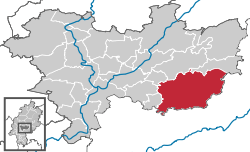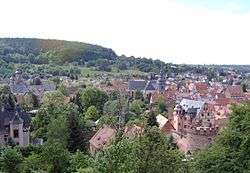Büdingen
| Büdingen | ||
|---|---|---|
|
Historic centre | ||
| ||
 Büdingen | ||
Location of Büdingen within Wetteraukreis district  | ||
| Coordinates: 50°17′27″N 9°6′45″E / 50.29083°N 9.11250°ECoordinates: 50°17′27″N 9°6′45″E / 50.29083°N 9.11250°E | ||
| Country | Germany | |
| State | Hesse | |
| Admin. region | Darmstadt | |
| District | Wetteraukreis | |
| Government | ||
| • Mayor | Erich Spamer (FW) | |
| Area | ||
| • Total | 122.87 km2 (47.44 sq mi) | |
| Population (2015-12-31)[1] | ||
| • Total | 21,785 | |
| • Density | 180/km2 (460/sq mi) | |
| Time zone | CET/CEST (UTC+1/+2) | |
| Postal codes | 63654 | |
| Dialling codes | 06042 | |
| Vehicle registration | FB, BÜD | |
Büdingen is a town in the Wetteraukreis, in Hesse, Germany. It is famous for its well-preserved, heavily fortified medieval city wall and half-timbered houses.
Geography
Location
Büdingen is in the south of the Wetterau below the Vogelsberg hills at an altitude of approx. 160 meters. The city is situated 15 km northwest of Gelnhausen and about 40 km east from Frankfurt am Main. Historically, the city belongs to Oberhessen.
Geology
Büdingen is situated in a wet and swampy valley. The castle and the old town therefore rest on centuries-old oak planks, placed horizontally across vertical beech piles (poles). The water level has to be kept high enough so that no air can reach these foundations.
Districts
Since 1972, the city includes the following formerly independent municipalities: Aulendiebach, Büches, Büdingen (core or centre), Calbach, Diebach am Haag, Düdelsheim (the largest municipality), Dudenrod, Eckartshausen, Lorbach, Michelau, Orleshausen, Rinderbügen, Rohrbach, Vonhausen, Wolf, and Wolferborn.
In the same year, the county (Landkreis) of Büdingen was dissolved, and Büdingen and the county of Friedberg formed the Wetteraukreis, with Friedberg becoming the new county capital.
History



Around 700 the wooden church of Saint Remigius was built by an unknown lord. At 847 a "Büdingen" was named in a document for the first time, but it is not clear which Büdingen was meant, because there are some other smaller towns with the same name in Germany and Lorraine. An additional level was added to St. Remigius's church in about 1050 and the building has basically remained unchanged since then.
In 1131 the noblemen of Büdingen were mentioned for the first time. They became Burggrafen of Gelnhausen in 1155. The villa (Latin: city) Büdingen was officially mentioned in 1206. The ruling noblemen of Büdingen died out with Gerlach II before 1247.
Their heirs were the noblemen of Hohenlohe-Brauneck, of Isenburg-Kempenich, of Trimberg, of Hohenlohe and of Isenburg. On July 26, 1330, Holy Roman Emperor Louis IV granted the status of a market town to Luther of Büdingen.
With his edict of liberty in 1353, Burggraf Heinrich II granted freedom and some independence to the people of Büdingen. In return the people had to defend the city, so the Marksmen's Society was founded. This society still exists today as one of the oldest rifle associations in Germany.
Since 1442 the masters of Büdingen have been known as Grafen of Isenburg-Büdingen. After a local war, Graf Ludwig II built an enormous new defensive wall with 22 towers around the old stronghold between 1480 and 1510. These walls are still nearly complete and they are one of the most important medieval strongholds in Germany.
In 1521, Martin Luther allegedly passed through. In the same year, the town became Protestant, later to become Calvinist.
In 1576, the Black Death killed many inhabitants, as in 1632.
In 1590, a great fire destroyed many buildings.
Between 1633 and 1634 114 people were victims of witch hunting, although the first prosecutions took place in 1567. During the Thirty Years' War, in 1634, the town was taken by Imperial troops, defeating the Swedish occupants.
In 1578 Emperor Rudolf II rewarded the Counts of Büdingen with the "Jubilate"-market (from the Latin word jubilate: to praise); always an occasion for feasting. In 1806 the County of Ysenburg-Büdingen was annexed to the Principality of Isenburg-Birstein. After the Congress of Vienna, the Principality of Isenburg was divided in 1816 between the Grand Duchy of Hessen-Darmstadt and the Electorate of Hessen; Büdingen went to Hesse-Darmstadt. In 1840, Graf Ernst Casimir III was promoted by a decree of the grand duchy to the status of hereditary prince.
In 1601 Graf Wolfgang Ernst founded the Latin School, known today as the Wolfgang-Ernst-Gymnasium. In 1712 Graf Ernst Casimir I issued an edict of tolerance permitting religious dissenters to settle in Büdingen. As a result, by 1724 there was a suburb at the Lower Gate (Jerusalem Gate) where Huguenots, Waldensians, sectarians, and other separationists lived.
In 1822, administration and justice were split in the Grand-Duchy of Hesse-Darmstadt. Büdingen became seat of the Büdingen counties lawcourt, which was followed in 1852 by the installation of the district of Büdingen. In 1839, the laborers' school (later called the trade school) was founded. The Mathildenhospital was built between 1867 and 1868. In 1879, a credit union (today the People's Bank), was founded. Büdingen has been a garrison town since 1936; American troops were stationed there since 1945. The last American troops (1st Squadron, 1st Cavalry Regiment) departed Büdingen on August 15, 2007, ending 71 years of town history as a military garrison.
Mail service between Büdingen and Frankfurt am Main began in 1739: one mail coach and two mounted messengers a week. The Gießen–Gelnhausen railway, including Büdingen station was opened between Büdingen and Gelnhausen on 30 November 1870. In 1879 the new Gymnasium was built, including a gym and the principal's residence. Between 1888 and 1895 built a water main and began partial installation of a sewage system. The municipal gas works was established in 1910, and Büdingen received electric light in 1913.
Trivia
- Büdingen was the home to the 1st Squadron, 1st Cavalry Regiment (1-1 CAV), the Division Cavalry unit for the United States Army's 1st Armored Division.
- Büdingen was formerly the home to the 3rd Squadron, U.S. 12th Cavalry Regiment (3-12 CAV), the Division Cavalry unit for the United States Army's 3rd Armored Division from 1957 to 1989. In February 1989 it was reflagged as the 4th Squadron, 7th Cavalry. The town was also formerly home to the 3rd Battalion, 61st Air Defense Artillery (later 3/5 ADA), the Division ADA unit for the 3rd Armored Division (the Spearhead division).
- Albert Einstein visited the castle museum incognito in 1952, but confirmed this later in a letter[2]
International relations
| Twin Towns | _Staedtepartnerschaft.png) | ||
|---|---|---|---|
| City | Region / Country | External Link | |
| Bruntál | Moravian-Silesian Region / Czech Republic | www.mubruntal.cz | |
| Herzberg | Brandenburg / Germany | www.herzberg-elster.de | |
| Gistel | West Flanders / Belgium | www.gistel.be | |
| Loudéac | Brittany / France | www.ville-loudeac.fr | |
| Tinley Park | Illinois / United States | www.tinleypark.org | |
Sons and daughters of the city
- Diether von Isenburg (1412-1482), Archbishop of Mainz (1459-1463 and 1475-1482).

- Johann Samuel König (1712-1757), mathematician (König's theorem (kinetics))
- Johannes Jährig (1741-1795), Mongols - researcher and translator of Tibetan and Mongolian texts.
- Ernst Casimir II, 2nd Prince of Ysenburg and Büdingen (1808-1861), 2nd Prince to Ysenburg and Büdingen
- Bruno, 3rd Prince of Ysenburg and Büdingen (1837-1906), 3. Prince to Ysenburg-Büdingen
- Johann Ludwig Wilhelm Thudichum (1829-1901), founder of the Brain Chemistry
- Erich Geißler (1895-1967), Generalmajor, bearer of the Iron Cross Cross
- Ado Kraemer (1898-1972 in Berlin), chess composer
- Gerhard Wies (born 1961), silver medal winners in the Paralympics 2004 in Athens
Other personalities associated with the city: '
- Erasmus Alber, also Alberus (around 1500-1553) German theologian, reformer and poet, about 1520 teacher in Büdingen
- Hermann von Ihering (1850-1930), physician, zoologist and [paleontologist] lived here the last nine years of his life and is buried in Büdingen.
- Dr. Christian Schwarz-Schilling, High Representative for Bosnia and Herzegovina (2006-2007), former Federal Minister of the Interior (1982-1992) and member of the German Bundestag for the CDU (1976-2002). Schwarz-Schilling was managing director of the Accumulatorenfabrik Sonnenschein from 1957 to 1982.
- Siegfried Müller, (born 1935), Social Democrat and trade unionist.
References
- ↑ "Bevölkerung der hessischen Gemeinden". Hessisches Statistisches Landesamt (in German). August 2016.
- ↑ Büdingens Beitrag zum Einstein-Jahr (archived version, in German)
External links
- Büdingen-Touristik (German)
- Fürst zu Ysenburg und Büdingen (German)
| Wikimedia Commons has media related to Büdingen. |

